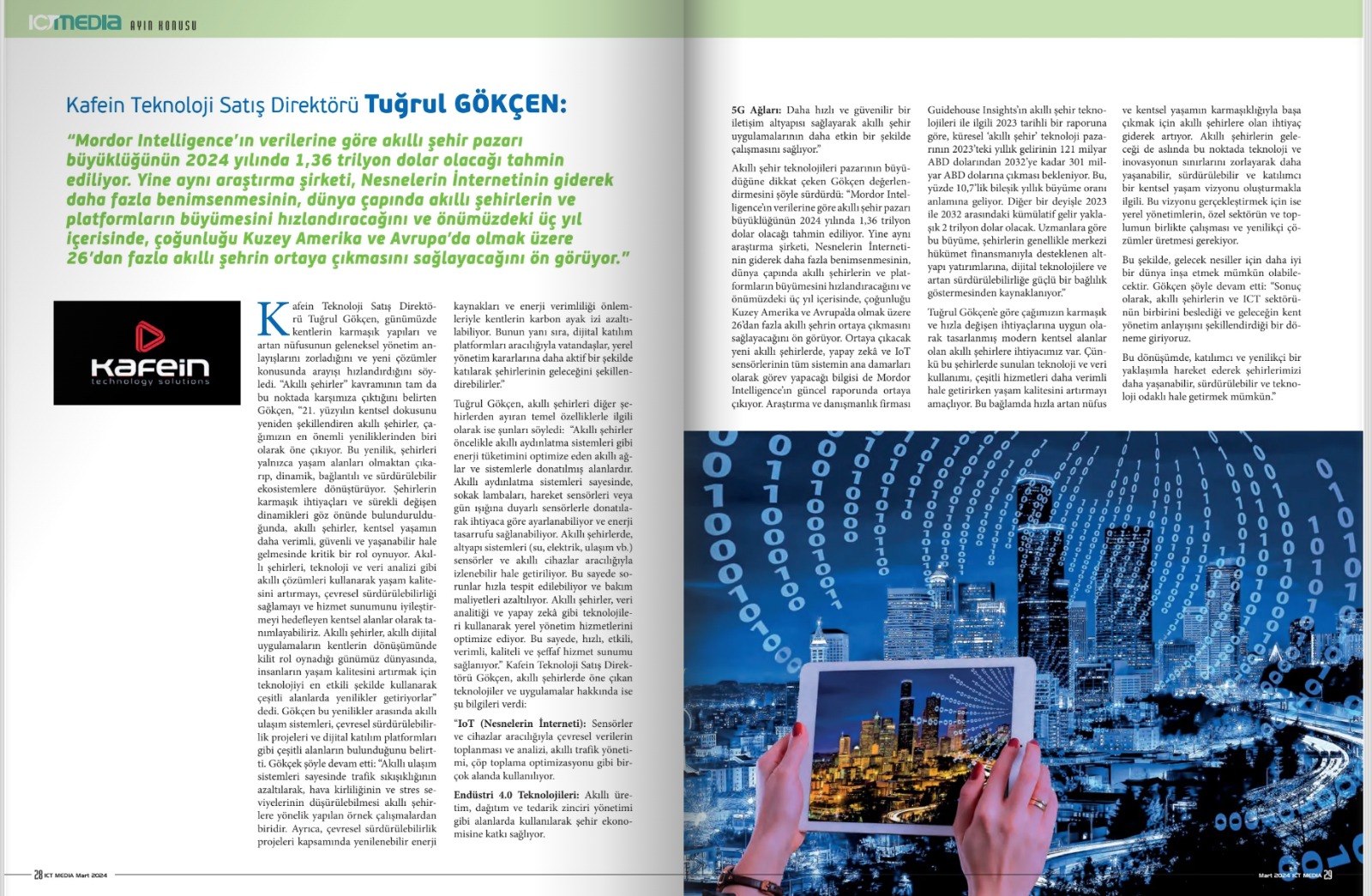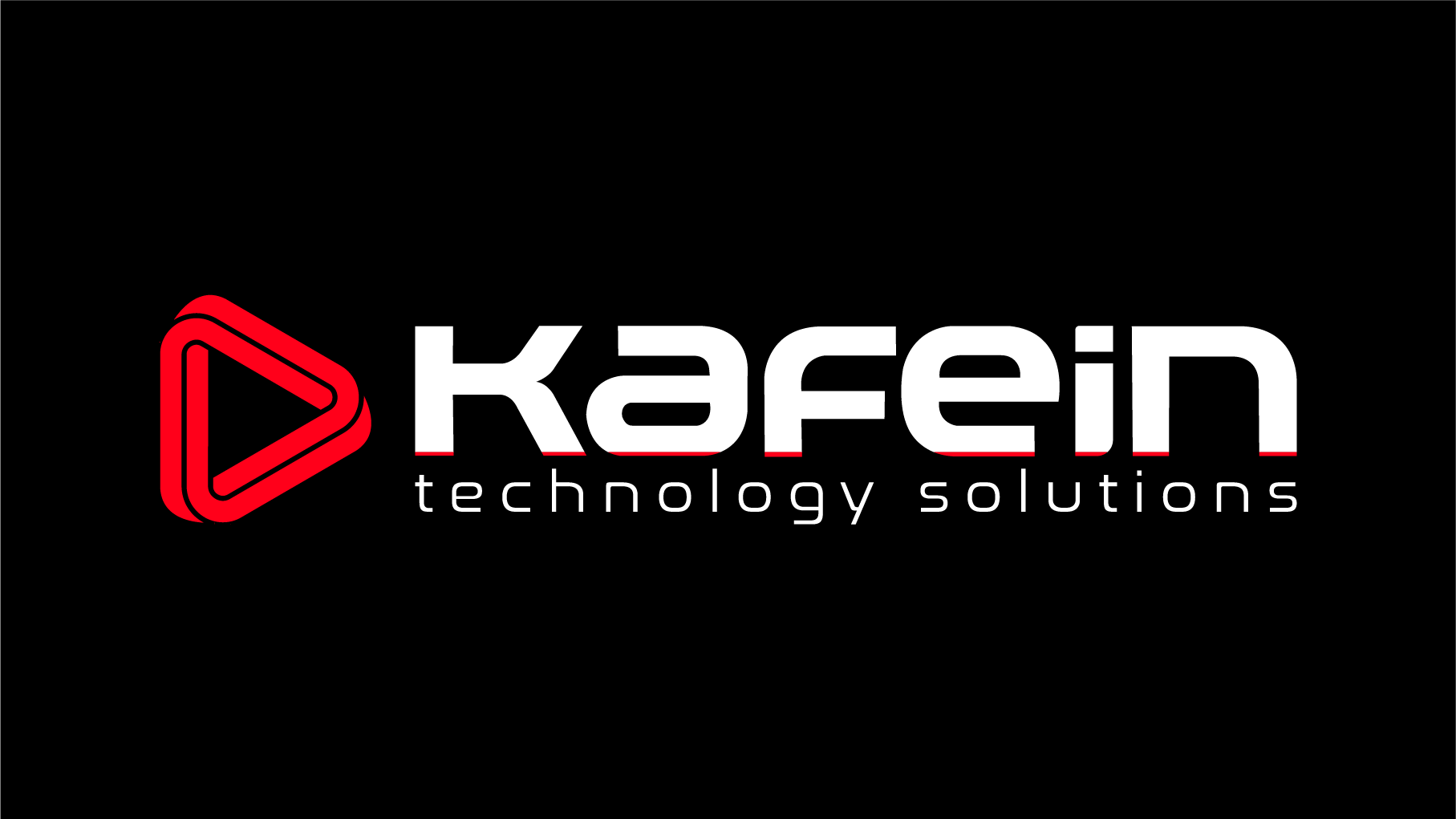-
KAFEIN IS 16 YEARS OLD!
Kafein keeps on bringing the future to our day, we get our strenghth through our visionary team, valuable clients and business partners....
-
Kafein Technology is featured in ICT Media Magazine!
The complex structures of cities and the increasing population are challenging traditional management approaches....
Kafein Technology Sales Director Tuğrul GÖKÇEN:
According to data from Mordor Intelligence, the smart city market size is expected to reach $1.36 trillion by 2024. The same research company also predicts that the increasing adoption of the Internet of Things (IoT) will accelerate the growth of smart cities and platforms worldwide, and that more than 26 smart cities, mostly in North America and Europe, will emerge within the next three years.
Kafein Technology Sales Director Tuğrul Gökçen stated that the complex structures of cities and the growing population are challenging traditional management approaches and accelerating the search for new solutions. He noted that the concept of "smart cities" has emerged precisely at this point, saying, "Smart cities, which are reshaping the urban fabric of the 21st century, stand out as one of the most important innovations of our time. This innovation transforms cities from mere living spaces into dynamic, connected, and sustainable ecosystems. Given the complex needs and constantly changing dynamics of cities, smart cities play a critical role in making urban life more efficient, safe, and livable." Gökçen defined smart cities as urban areas that aim to improve the quality of life, ensure environmental sustainability, and enhance service delivery by using smart solutions like technology and data analysis. He further added, "In today's world, where smart digital applications play a key role in the transformation of cities, smart cities are bringing innovations in various fields by using technology in the most effective way to improve people's quality of life." These innovations include areas such as smart transportation systems, environmental sustainability projects, and digital participation platforms. Gökçen continued, "One example of such initiatives in smart cities is reducing traffic congestion through smart transportation systems, which helps decrease air pollution and stress levels."
Additionally, within the scope of environmental sustainability projects, renewable energy efficiency measures can reduce the carbon footprint of cities. Furthermore, through digital participation platforms, citizens can more actively engage in local government decisions, shaping the future of their cities.
Tuğrul Gökçen, when discussing the key features that distinguish smart cities from others, said: "Smart cities are primarily areas equipped with smart networks and systems that optimize energy consumption, such as smart lighting systems. With smart lighting systems, streetlights can be equipped with motion sensors or light-sensitive sensors, allowing them to adjust based on need and provide energy. In smart cities, infrastructure systems (water, electricity, transportation, etc.) are made monitorable through sensors and smart devices. This enables problems to be quickly detected, reducing maintenance costs."
Smart cities optimize local government services by using technologies such as data analytics and artificial intelligence. This ensures the delivery of fast, effective, efficient, high-quality, and transparent services.” Kafein Technology Sales Director Gökçen shared information about the prominent technologies and applications in smart cities:
IoT (Internet of Things): The collection and analysis of environmental data through sensors and devices are used in various areas such as smart traffic management, waste collection optimization, and more.
Industry 4.0 Technologies: These are used in areas such as smart manufacturing, distribution, and supply chain management, contributing to the city economy.
5G Networks: Providing faster and more reliable communication infrastructure, enabling smart city applications to operate more effectively.
Highlighting the growth of the smart city technology market, Gökçen continued his evaluation: "According to Mordor Intelligence, the smart city market size is expected to reach 1.36 trillion dollars by 2024. The same research firm predicts that the increasing adoption of the Internet of Things (IoT) will accelerate the growth of smart cities and platforms worldwide, with more than 26 smart cities emerging in the next three years, mostly in North America and Europe. The latest report from Mordor Intelligence also reveals that in these emerging smart cities, artificial intelligence and IoT sensors will serve as the backbone of all systems. According to a 2023 report by the research and consulting firm Guidehouse Insights on smart city technologies, the global 'smart city' technology market is expected to grow from a revenue of 121 billion USD in 2023 to 301 billion USD by 2032. This represents a compound annual growth rate (CAGR) of 10.7%. In other words, the cumulative revenue between 2023 and 2032 will reach approximately 2 trillion dollars. Experts suggest that this growth is driven by cities' strong commitment to infrastructure investments typically supported by central government funding, digital technologies, and increasing sustainability efforts."
According to Tuğrul Gökçen, we need smart cities, which are modern urban areas designed to meet the complex and rapidly changing needs of our time. This is because the technology and data usage provided in these cities aim to enhance the efficiency of various services while improving the quality of life. In this context, the growing population and the complexity of urban life are increasing the need for smart cities. The future of smart cities is ultimately about pushing the boundaries of technology and innovation to create a more livable, sustainable, and participatory urban life vision. To realize this vision, local governments, the private sector, and society need to collaborate and develop innovative solutions.
In this way, it will be possible to build a better world for future generations. Gökçen continued: "As a result, we are entering an era where smart cities and the ICT sector feed into each other and shape the future understanding of urban management."
In this transformation, by adopting a participatory and innovative approach, it is possible to make our cities more livable, sustainable, and technology-driven!
*You can access the issue of ICT Media Magazine where this article is featured at the following link: https://online.fliphtml5.com/kfal/pgkb/#p=30




-a0b7a.jpg)